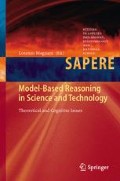Abstract
Model-based reasoning requires not only inferences about what is happening, but also evaluations of the desirability of what is happening. Emotions are a key part of such assessments, but sometimes they can lead people astray, as in motivated inference when people believe what fits with their desires. In contrast to motivated inference, fear-driven inference generates beliefs that people do not want to be true. Although paradoxical, this kind of inference is common in many domains, including romantic relationships, health, parenting, politics, and economics. This paper proposes that fear-driven inference results from gut overreactions, in which a feeling that something is wrong is erroneously taken as evidence that something really is wrong. We discuss psychological and neural mechanisms by which gut overreactions can lead to fear-driven inference, and show how a computer model of emotional coherence can explain both fear-driven and motivated inference.
Access this chapter
Tax calculation will be finalised at checkout
Purchases are for personal use only
References
Gilovich, T.: How We Know What Isn’t So: The Fallibility of Human Reason in Everyday Life. Free Press, New York (1991)
Gilovich, T., Griffin, D., Kahneman, D. (eds.): Heuristics and Biases: The Psychology of Intuitive Judgment. Cambridge University Press, Cambridge (2002)
Kahneman, D., Tversky, A. (eds.): Choices, Values, and Frames. Cambridge University Press, Cambridge (2000)
Bastardi, A., Uhlmann, E.L., Ross, L.: Wishful thinking: belief, desire, and the motivated evaluation of scientific evidence. Psychol. Sci. 22, 731–732 (2011)
Kunda, Z.: The case for motivated reasoning. Psychol. Bull. 108, 480–498 (1990)
Kunda, Z.: Social Cognition: Making Sense of People. MIT Press, Cambridge (1999)
Elster, J.: Explaining Social Behavior. Cambridge University Press, Cambridge (2007)
Mill, J.S.: A System of Logic, 8th edn. Longman, London (1970)
de la Fontaine, J.: Le loup et le renard. http://www.lafontaine.net/lesFables/afficheFable.php?id=214 (2012)
Mele, A.R.: Self-Deception Unmasked. Princeton University Press, Princeton (2001)
Schwartz, N., Clore, G.L.: Mood as information: 20 years later. Psychol. Inq. 14, 296–303 (2003)
Schwarz, N.: Feelings as information: informational and motivational functions of affective states. In: Higgins, E.T., Sorrentino, R. (eds.) Handbook of Motivation and Cognition: Foundations of Social Behavior, pp. 527–561. Guilford Press, New York (1990)
Salovey, P., Detweiler-Bedell, B.T., Detweiler-Bedell, J.B., Mayer, J.D.: Emotional intelligence. In: Lewis, M., Haviland-Jones, J.M., Barrett, L.F. (eds.): Handbook of Emotions, 3rd edn, pp. 533–547. Guilford Press, New York (2008)
Slovic, P., Finucane, M.L., Peters, E., MacGregor, D.G.: The affect heuristic. In: Gilovich, T., Griffin, D., Kahneman, D. (eds.) Heuristics and Biases: The Psychology of Intuitive Judgement, pp. 397–420. Cambridge University Press, Cambridge (2002)
Damasio, A.R.: Descartes’ Error: Emotion, Reason, and the Human Brain. G. P. Putnam’s Sons, New York (1994)
Schiller, R.: Irrational Exuberance, 2nd edn. Princeton University Press, Princeton (2005)
Todd, J., Dewhurst, K.: The Othello syndrome: a study in the psychopathology of sexual jealousy. J. Nerv. Ment. Dis. 122(4), 367–374 (1955)
Thagard, P.: Hot Thought: Mechanisms and Applications of Emotional Cognition. MIT Press, Cambridge (2006)
Thagard, P.: Why wasn’t O. J. convicted? Emotional coherence in legal inference. Cogn. Emot. 17, 361–383 (2003)
Scherer, K.R., Schorr, A., Johnstone, T.: Appraisal Processes in Emotion. Oxford University Press, New York (2001)
Prinz, J.: Gut Reactions: A Perceptual Theory of Emotion. Oxford University Press, Oxford (2004)
Thagard, P., Aubie, B.: Emotional consciousness: a neural model of how cognitive appraisal and somatic perception interact to produce qualitative experience. Conscious. Cogn. 17, 811–834 (2008)
Thagard, P.: The Brain and the Meaning of Life. Princeton University Press, Princeton (2010)
Fisher, H.: Why We Love: The Nature and Chemistry of Romantic Love. Henry Holt, New York (2004)
Hatfield, E., Cacioppo, J.T., Rapson, R.L.: Emotional Contagion. Cambridge University Press, Cambridge (1994)
Iacoboni, M.: Mirroring People: The New Science of How We Connect with Others. Farrar, Straus and Giroux, New York (2008)
Akerlof, G.A., Shiller, R.J.: Animal Spirits: How Human Psychology Drives the Economy, and why it Matters for Global Capitalism. Princeton University Press, Princeton (2009)
Loewenstein, G.F., Weber, E.U., Hsee, C.K., Welch, N.: Risk as feelings. Psychol. Bull. 127, 267–286 (2001)
Harris, S., Kaplan, J.T., Curiel, A., Bookheimer, S.Y., Iacoboni, M., Cohen, M.S.: The neural correlates of religious and nonreligious belief. PLoS One 4(10), e7272 (2009). doi: 7210.1371/journal.pone.0007272
Harris, S., Sheth, S.A., Cohen, M.S.: Functional neuroimaging of belief, disbelief, and uncertainty. Ann. Neurol. 63, 141–147 (2008)
Hacking, I.: The Emergence of Probability. Cambridge University Press, Cambridge (1975)
Thagard, P.: The Cognitive Science of Science: Explanation, Discovery, and Conceptual Change. MIT Press, Cambridge (2012)
Acknowledgments
Thagard’s research is supported by the Natural Sciences and Engineering Research Council of Canada.
Author information
Authors and Affiliations
Corresponding author
Editor information
Editors and Affiliations
Rights and permissions
Copyright information
© 2014 Springer-Verlag Berlin Heidelberg
About this paper
Cite this paper
Thagard, P., Nussbaum, A.D. (2014). Fear-Driven Inference: Mechanisms of Gut Overreaction. In: Magnani, L. (eds) Model-Based Reasoning in Science and Technology. Studies in Applied Philosophy, Epistemology and Rational Ethics, vol 8. Springer, Berlin, Heidelberg. https://doi.org/10.1007/978-3-642-37428-9_3
Download citation
DOI: https://doi.org/10.1007/978-3-642-37428-9_3
Published:
Publisher Name: Springer, Berlin, Heidelberg
Print ISBN: 978-3-642-37427-2
Online ISBN: 978-3-642-37428-9
eBook Packages: Humanities, Social Sciences and LawPhilosophy and Religion (R0)

